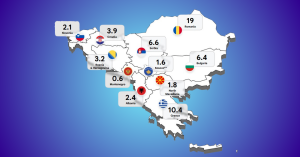How can banks efficiently become digital? According to a 2020 report on the digital challenges Bulgarian banks are facing, 50% of bank costs are allocated for employee salaries and office costs. Due to their legacy systems and established infrastructure, Bulgarian traditional banks often face challenges when embracing digital services. Yet, with the developments in the local fintech sector which is growing at an annual rate of 25%, as well as the persistent development of AI/ML startups, banks are starting to adopt and upgrade digital banking solutions, while also becoming more involved with digital initiatives.
One example of such a digital adopter is TBI Bank. With its history going back to 2002, the bank has grown to be one of the local institutions that are open to innovation and is focused on becoming one of the next-generation digital banks in the region. On March 16, TBI Bank announced its expansion to Lithuania, where it will be opening an entirely digital branch to offer consumer lending services. With this move, the bank hopes to enlarge its presence in Europe and, eventually, set foot in the Nordics, Baltics, and Central Europe. As noted by Petr Baron, CEO of TBIF (TBI Bank), the strategy of TBIF is to strengthen its digital footprint across the continent. TBI’s mother company is 4finance, one of Europe’s largest and fastest-growing online and lending groups whose main priority is to deploy digital, data analysis tools in its branches to answer customer mobility.

Petr Baron, CEO of TBI Bank, Image Credit: TBI Bank
Expanding digitally
Apart from Romania and Bulgaria, TBI Bank also facilitates banking transactions in Germany, Denmark, Sweden, and Poland, thus servicing over 1 million people. The phydigital brand structure of the company equates to the importance of both digital and physical services, thus differentiating the entity from traditional banks. The Lithuanian expansion will enable the bank to enrich its services portfolio, especially in the areas connected to credit risk and risk of concentration. The entirely digital branch in Lithuania will also further enhance TBI’s position as an international banking services provider while giving clients a broader spectrum of services to choose from. The digital sales and marketing expertise of 4finance is crucial for successfully completing the expansion, an official statement shared.
Digital initiatives in a roll
So far, TBI Bank has fostered a number of digital initiatives, including its partnerships with Onfido, FintechOS, and Provenir. The strategic partnership with AI identity verification startup Onfido facilitates easier customer signup to its banking services through identity verification based on biometric analysis of a customer’s government-issued identity document (ID) and a real-time selfie. The collaboration between TBI and FintechOS resulted in the integration of the startup solution to create personalized individual and business banking services and a digital lending platform while processing and controlling more easily customer data through automating KYC for faster risk profiling. When it comes to Provenir, TBI Bank implemented the risk analytics and decisions solution of the startup to automate and accelerate the credit and loan decisions it makes.
The bank has also facilitated the SEPA Instant transactions service which enables users to make and receive real-time payments in euros between cross-border bank accounts in the eurozone. As a part of its phydigital structure, the entity has introduced the TBIPay point-of-sale platform while upgrading its mobile banking app.








